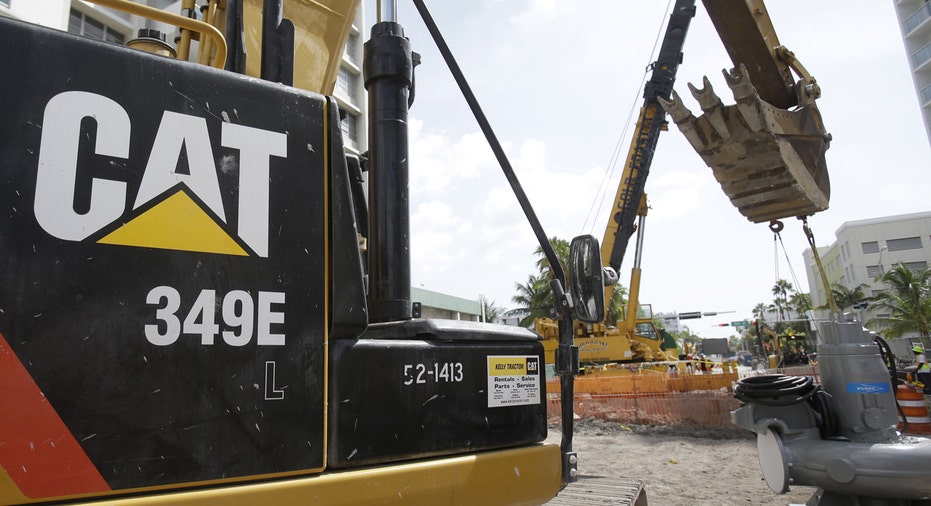Caterpillar Tax Probe Gathers Steam

For Jim Umpleby, who took charge as Caterpillar's chief executive little more than two months ago, an escalating criminal investigation threatens to upstage the heavy-machinery maker's efforts to regain footing in global construction and mining markets.
The manufacturing giant has faced several investigations in recent years into whether it is paying enough U.S. taxes. It has been contesting an approximately $2 billion bill from the Internal Revenue Service. And now, following raids by federal agents at its Peoria, Ill. headquarters and two nearby locations last week, it is facing questions about whether it adheres to U.S. export rules.
At least one shareholder group is calling for a review of Caterpillar's tax strategy, among other steps to improve corporate governance. Caterpillar shares have fallen about 5% since the raids.
Caterpillar hasn't been accused of any criminal wrongdoing. As Caterpillar defends itself as honorable, some Wall Street analysts are scratching their heads.
"There's still a lot of questions to be answered," Stifel analyst Stanley Elliott said.
Investigators from the IRS, the Commerce Department's Office of Export Enforcement and the Federal Deposit Insurance Corp.'s Office of Inspector General raided the three Caterpillar locations on March 2 in search of information related to a Swiss subsidiary of the company that has been at the center of the long-running tax dispute.
Days later, at an industry event in Las Vegas, Mr. Umpleby said the company was surprised by the raids because it had been cooperating with a yearslong government investigation into the Swiss subsidiary.
"Caterpillar has a long reputation, and a very good reputation, as an ethical company," Mr. Umpleby added, during a press conference at a construction-equipment show on Tuesday. "We do the right thing. We'll continue to do the right thing."
The federal agents sought information related to data the company has filed with the Commerce Department about its export products, according to search warrants used in the raid. Agents spent time in the company's treasurer's office and on a floor that houses offices of senior executives, according to people familiar with the matter.
Caterpillar has said in public filings it received subpoenas from a federal grand jury seeking information about the Swiss unit, CSARL, which Caterpillar says is "an operating company with hundreds of employees around the world who perform strategically critical work to support our customers in non-U.S. markets."
Legal experts, including former Commerce and Justice Department officials who have no direct knowledge of the investigation but have reviewed search warrants for the raid, said investigators could be looking for evidence of inaccurate export valuations in government filings, or for evidence of "diversion," the shipping of products to countries that are under U.S. trade restrictions. The warrants were leaked and had been posted online by a local TV station.
The search warrants could indicate investigators were also looking for evidence of possible violations of the accounting provisions of the Foreign Corrupt Practices Act. The law prohibits bribes of overseas government officials and imposes penalties for filing inaccurate financial statements.
Caterpillar said it has "no reason to believe" the investigation relates to the antibribery law, sanctioned countries or other trade-related restrictions such as those imposed by the Office of Foreign Assets Control. "We are still trying to determine the complete picture," Caterpillar said.
The agencies involved declined to comment about the investigation. The U.S. attorney's office for the Central District of Illinois, which is leading the investigation, declined to comment.
The CtW Investment Group, an arm of union coalition Change to Win, is calling for Caterpillar to disclose steps it is taking to reduce noncompliance risks, and either appoint an independent committee or shake up its audit committee. The company said it reviewing the letter.
The Swiss subsidiary also was the subject of a civil probe by the Securities and Exchange Commission, according to Caterpillar. The SEC ended the probe in 2015 saying it didn't intend to recommend enforcement action. In January that year, Caterpillar got a subpoena from a federal grand jury in the Central District of Illinois seeking financial information about its U.S. and foreign subsidiaries.
The 2014 probe by the Senate Permanent Subcommittee on Investigations found Caterpillar's U.S. operation effectively removed itself from the business of selling replacement parts to independent dealers overseas by assigning the profit to the Swiss subsidiary, lowering its U.S. tax bill. A Caterpillar vice president told the panel at the time: "We pay everything we owe."
The role of the watchdog at the FDIC, a banking regulator, remains unclear. That office commissioned a report by a Dartmouth College accounting professor that claims Caterpillar engaged in tax and accounting fraud, according to a person familiar with the matter.
Special agents of the FDIC inspector general have law-enforcement powers and typically assist in criminal investigations involving banks. The report, by Leslie Robinson, associate professor of business administration at Dartmouth's Tuck School of Business and whose contents were previously reported by the New York Times, hasn't been publicly released. It examined wire transfers by Caterpillar to repatriate overseas cash that had been structured as loans between the U.S. and non-U.S. units to allegedly avoid paying U.S. taxes, the person familiar with the report said. The report was delivered to the government in February, this person said.
Caterpillar said authorities provided it with a copy of the report on Thursday. "Caterpillar takes very seriously its obligation to follow tax law and pay what it owes," the company said.
--Ryan Tracy, Richard Rubin, Aruna Viswanatha contributed to this article.



















